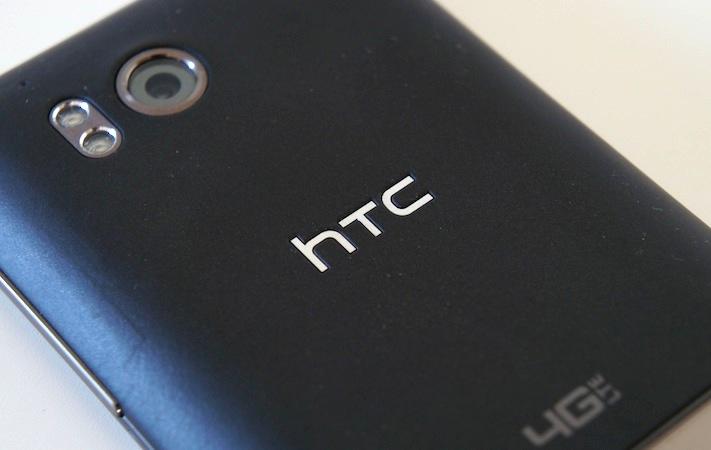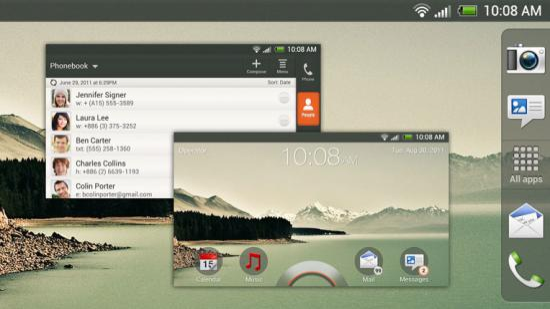
Since the very beginning, HTC's Sense UI has been a love or hate thing. There are Android purists who prefer their experience with Google's mobile software to be untainted, or a vanilla experience, and there are customized UI junkies. In between, there are the novices that don't know the difference. Whether you're a fan or hater of Sense, there's one unavoidable fact: Sense UI is an in-your-face, top to bottom overhaul of Android. AOSP goes into HTC looking like one thing and comes out looking entirely different.
In the beginning, these were welcomed changes. Android versions 1.0 through 2.2 were very rough around the edges, frayed even. It looked very engineered and far from modern or aesthetically pleasing. So a few interface customizations were in order to add some polish to the interface and to make the Android experience less ... daunting. Enter the three major alternative Android interfaces: Sense UI, TouchWiz and MOTOBLUR (now referred to as Motorola Applications Platform).
More recently, however, Google has put a lot of focus, hard work and dedication into making the stock Android interface a much more pleasing one. They hired Matias Duarte, the father of the fluid and much-loved webOS interface, to be the Director of Android OS User Experience. Duarte helped bring a lot of the interface changes that were introduced in the first (and only) tablet-specific version of Android, Honeycomb, and subsequently in the latest update, Ice Cream Sandwich.
Android 4.0 is a new beast. It's far from perfect, but it's a huge step in the right direction for the Android development team. They've added polish where we never knew it was needed or possible and some features we never knew we would like, or want for that matter. There are some inconsistencies and parts of the interface that simply do not make sense to me at all. But the point is, vanilla Android has come a very long way in a short time, and Google has very nearly attained their goal of removing the need for secondary interfaces.
Now, that's not to say HTC, Samsung, Motorola and every other OEM will quit putting their touch on Android. Each OEM has a different plan for and opinion of the software. And not everyone is going to like stock Android as is, so third-party interfaces are good to have around. But it's about time the cut a little extra baggage on the interfaces. They're ... overbearing, to say the least.
While some are clearly worse than others, Sense UI is notorious for being the most in-your-face experience. Not a single element of the stock interface stays the same. We were curious how interfaces would work with Android 4.0 and had assumed that since they were lightweight with Honeycomb that the lightweight alterations would, too, appear in ICS. Turns out, we couldn't have been more wrong. This isn't exactly news anymore, though. We've seen images of Sense UI and TouchWiz (presumably) running atop Android 4.0 several times now. And every time I see it, it cringe a little more.

Yesterday evening, the RUU (ROM Update Utility) for the HTC Endeavor was leaked, showing off quite a few screen shots of the updated Sense 4.0 interface. Unsurprisingly, it looks absolutely nothing like Ice Cream Sandwich. Every single aspect of the interface has been tweaked. It looks like legacy Android, pre-Ice Cream Sandwich, and something about it forces me to believe it will perform like legacy Android – lag, crashes, inexplicable battery drain, etc. Sense always has and as long as it's a complete over haul, it will likely remain that way.
But what's even worse is the level of fragmentation that HTC has cause within its own line of devices. Some are still on Froyo, others are on Gingerbread and soon the first line of ICS devices will launch. Likewise, some devices will still be on Sense 2.0 while the others will be on Sense 3.0, 3.5 and 4.0. The customizations are so deep and stretch so far and wide across the system that it makes it difficult to push these changes out to every device in a timely manner.
I'm not saying HTC needs to completely abandon Sense UI. While I wouldn't mind it at all, there are a lot of people out there that would be readying petitions, vowing to never buy from HTC again and threatening the Taiwanese handset makers. And they have some things going for them, like changeable themes and an extremely handy lock screen. They just need to lighten the load a bit.
It just seems like HTC is no longer worried about user experience, how fluid the software is or how quickly updates roll out, but more concerned about making sure their software looks nothing like Google's.
What say you, Sense lovers and haters? Does HTC need to cut some weight and make Sense a little less domineering? Should they embrace some of the major improvements that Google has made in Ice Cream Sandwich? If they focused less on changing every line of Android source code and worried more about updating their existing devices, it would be better for us all.